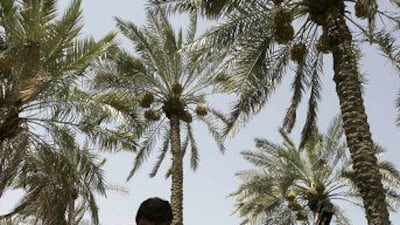Iraq's date palm industry, traditionally a major employer and exporter, has yet to begin recovery from the 2003 invasion and remains in a crisis caused by underfunding, mismanagement and neglect, according to key industry figures. Before the war, Iraq produced about 900,000 tonnes of dates a year, much of which was sold outside the country. Today, annual production is approximately 350,000 tonnes and significant proportions of that output are of low quality or spoiled in poor storage facilities.
"Iraq was one of the world's leading date producers, but there has been a dramatic decline," said Ahmed Hassan, president of Iraq's general authority for dates. "There has been a decline in numbers of palms that began in the 1960s and it has continued since." He blamed a "lack of interest" by the authorities in promoting good farming habits and establishing a coherent system of production, storage and sales. In addition to such institutional problems, a deepening environmental crisis has further hamstrung the industry, with years of drought taking a heavy toll on the nation's agricultural sector.
"The farmers are also responsible, they have been trying to get high profits at the expense of sustainability," he said. "And there is a water scarcity that has been made worse by use of inefficient irrigation methods." In September, Iraq's prime minister, Nouri al Maliki, approved a project by a UAE-based company to make biofuel from dates that were not fit for consumption or export. According to the Iraqi government the scheme would provide a commercial incentive to expand date production, and give farmers a place to sell otherwise unusable produce.
And because it uses spoiled or low-quality dates, it does not require a wholesale renovation of rundown storage and transportation facilities, an advantage given the problems in getting such large scale infrastructure projects completed in Iraq. Although the move may signal a positive development, there are still concerns that the industry is not getting the attention and investment it requires. "The government has neglected the date palm business for a long time and from 2003 to the present day orchards containing hundreds of large palms that should be productive are idle," said Saad Kndoug, president of Iraq's association of dates. "The price of dates is still too low and that means it is hard to make businesses work."
The US military and state department have been trying to help revitalise Iraq's damaged agricultural sector on a province-by-province basis, encouraging new irrigation methods and trying to establish commercially viable farms. But officials say they have struggled to make headway, in part because Iraqi farmers are used to operating under a heavily subsidised, socialist-style, state-commanded system. A lack of clear guidance from the ministry of agriculture and corruption are also problems.
One of the theories behind the effort is that unemployment helps to drive the insurgency. Without jobs and without an income, young men who might work on a farm will instead perhaps plant bombs or throw hand grenades for money. That reasoning in large part underpinned the Awakening Council scheme, by which tens of thousands of tribal members were paid a couple of hundred dollars a month to provide security. It helped to pull men in financial difficulty out of the influence of insurgent groups.
In terms of national wealth, oil production has long been of much greater significance than date exports. But date farms have provided significant numbers of ordinary Iraqis with a livelihood, while oil wealth tends to be held in the hands of the elite. In some rural areas, it is typical for date farming to be a mainstay of the local economy, with all the men, women and children of a family working at harvest time. Consequently, when farms fail, it can have a devastating impact on a community, economically and socially.
"My job is to climb the trees and to pick the dates," said Naim Hussein, a teenager working the orchards in Wasit province, south of Baghdad. "The mothers and sisters and daughters of all our families also help, they process them and get the juice. "We all have to work together if we are to get any benefits and money." But the various piecemeal attempts that have so far been made to get the date industry functioning properly are not enough, according to a specialist agricultural engineer, Kamel al Issawi. He urged the need for greater co-ordination.
"What is needed is a strategic plan that will properly encourage production of dates to the necessary standards and the export of dates. "It is not just one problem that we are facing, which is why it needs an overall strategy. If you produce more dates but cannot process them or get them to the market, they are no use. "We also need, as a matter of urgency, a plan to prevent the spread of damaging parasites in the palm trees that are threatening those orchards that we do still have."
Mr Hassan, of the general authority for dates in Iraq, also said there was little sign of the situation improving on any large scale. "Most of the factories stopped work because of the war and they have not started again," he said. "We need the government to provide support in the whole process. That will be good for our industry and there will be benefits for others. "If the date production is good, other industries can grow strong around it."
@Email:nlatif@thenational.ae

